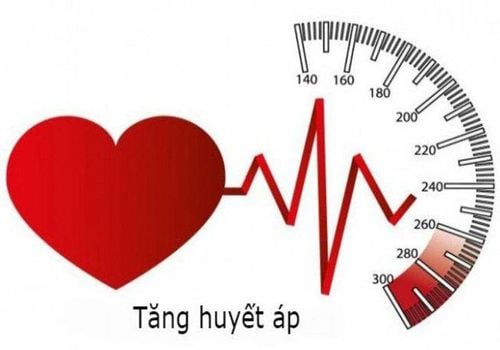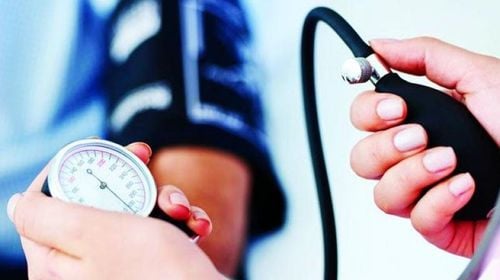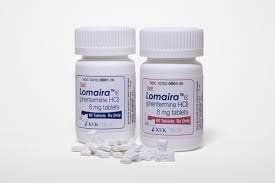This is an automatically translated article.
The article is professionally consulted by BSCK II Nguyen Quoc Viet - Department of Medical Examination & Internal Medicine - Vinmec Danang International General Hospital.
Prehypertension is a warning sign of future risk of developing high blood pressure. High blood pressure puts the patient at risk of heart attack, stroke, heart failure, kidney failure, etc. So the patient must be alert right from the pre-hypertensive stage.
1. What is prehypertension?
Prehypertension is a combination of normal and high-normal blood pressure, meaning a systolic blood pressure of 120-139 mmHg and a diastolic blood pressure of 80-89 mmHg.2. Symptoms of Pre-Hypertension
Similar to hypertension, prehypertension often causes no symptoms. The only way to help you identify the disease early is to have your blood pressure checked regularly.
You can go to the nearest medical facility to check your blood pressure periodically, or measure your blood pressure yourself at home. If you feel perfectly fine, but your blood pressure is above 120/80 mmHg again, wait 2-3 days before having the test again. If blood pressure levels continue to be high, you should see a doctor for further diagnosis and advice because if left for a long time, there is a risk of real hypertension, and possible complications of diabetes. high blood pressure such as heart failure , kidney failure , stroke , myocardial infarction , even death...
Trắc nghiệm: Bạn có hiểu đúng về huyết áp cao không?
Huyết áp cao còn được gọi là kẻ giết người thầm lặng vì bệnh thường không có triệu chứng. Thiếu hụt kiến thức về huyết áp cao có thể làm cho tình trạng bệnh trở nên trầm trọng hơn. Dưới đây là những câu hỏi trắc nghiệm vui giúp bạn hiểu đúng về bệnh cao huyết áp.3. Causes of Pre-Hypertension
Certain disorders or conditions can lead to pre-hypertension including:
Factors that increase pressure on the artery walls have, atherosclerosis, fatty deposits in the artery walls; Shortness of breath while sleeping; Diseases related to the kidneys; adrenal disease; thyroid disease; Using certain medications, including birth control pills, cold medicines, decongestants, pain relievers, corticosteroids, cocaine, and stimulants.

4. Is pre-hypertension dangerous?
According to statistics, prehypertension affects 25-50% of adults worldwide and increases the risk of developing true hypertension. If you have prehypertension, it means your blood pressure readings are higher than normal, but not high enough to make a definitive diagnosis of hypertension according to the diagnostic criteria.
As its name suggests, prehypertension is a warning sign of future risk of developing high blood pressure. High blood pressure increases the risk of heart attack, stroke, coronary heart disease, heart failure, and kidney failure.
5. Risk factors for prehypertension
Overweight or obese: As the body mass increases, more blood is required to deliver oxygen and nutrients to the body's tissues. As the volume of blood circulating through the blood vessels increases, the blood pressure on the artery walls also increases. Age: Most young people are more likely to have pre-hypertension than older adults. Gender: Prehypertension is not as common in women as it is in men. Race: High blood pressure is especially common in blacks, and develops at an earlier age than in whites. Family history of high blood pressure: If close blood relatives such as a parent or sibling have high blood pressure, you are more likely to develop high blood pressure. Inactivity: People who are inactive, do not exercise can increase the risk of high blood pressure and increase the risk of obesity. Eat more salt (sodium) or less potassium: These are two important nutrients in the body to regulate blood pressure. If you eat too much sodium or too little potassium, you are more likely to have high blood pressure. Tobacco use: Smoking or being around other people who smoke can raise your blood pressure. Drinking too much alcohol: Drinking too much beer can raise blood pressure. In addition, some cases may appear pre-hypertension without any specific cause.

6. Treatment and prevention of prehypertension
In the treatment of pre-hypertension, lifestyle modification is still the optimal and most effective solution. Here are some ways to help control pre-hypertension:
Eat healthy foods Choose fruits, vegetables, whole grains, poultry, fish and low-fat dairy foods. Adding more potassium by eating 3-5 ripe bananas daily, eating foods low in saturated fat and industrial fat can help lower blood pressure.
Maintain a moderate body mass Maintaining a healthy weight or losing weight if you are overweight or obese can help you control your blood pressure and reduce your risk for related health problems.
Use less salt Reducing a little sodium in your diet can lower blood pressure by 2-8 mmHg. Limit processed and canned foods.
Get physically active This can help lower your blood pressure, manage stress, reduce your risk of other health problems, and keep your weight under control. The best exercises to lower blood pressure include walking, jogging, biking, swimming or dancing.
Limit alcohol and beer If you drink alcohol, drink in moderation. For healthy women and men over 65 years of age can drink one drink per day.
Don't smoke Smoking damages the entire wall of blood vessels and accelerates the hardening of the arteries, rapidly increasing the risk of cardiovascular disease.
Stress management Reduce stress as much as possible. Practice healthy coping techniques like muscle relaxation, deep breathing or meditation, and get enough sleep.
Check your blood pressure regularly You should regularly monitor your blood pressure readings to update your health status and immediately notify your doctor if your blood pressure readings are higher than normal.
Consult your doctor about your blood pressure To reduce your risk of developing high blood pressure, talk to your doctor about your blood pressure and get advice about diet and exercise to help reduce your risk. hypertensive disease.
Prehypertension usually does not present with symptoms. Therefore, to detect whether you have pre-hypertension or not, the best way is to monitor your blood pressure regularly at home and check at least once every 6 months at medical facilities for measures. earliest prevention.
Vinmec International General Hospital is a hospital system with a leading name and reputation among hospitals in Vietnam, with outstanding superiority in quality of medical staff, equipment and technology. Modern, professional service. In particular, Vinmec has become a prestigious medical address for many customers when deploying Cardiovascular screening packages, helping to examine and detect cardiovascular diseases at the earliest, including hypertension.
Please dial HOTLINE for more information or register for an appointment HERE. Download MyVinmec app to make appointments faster and to manage your bookings easily.














